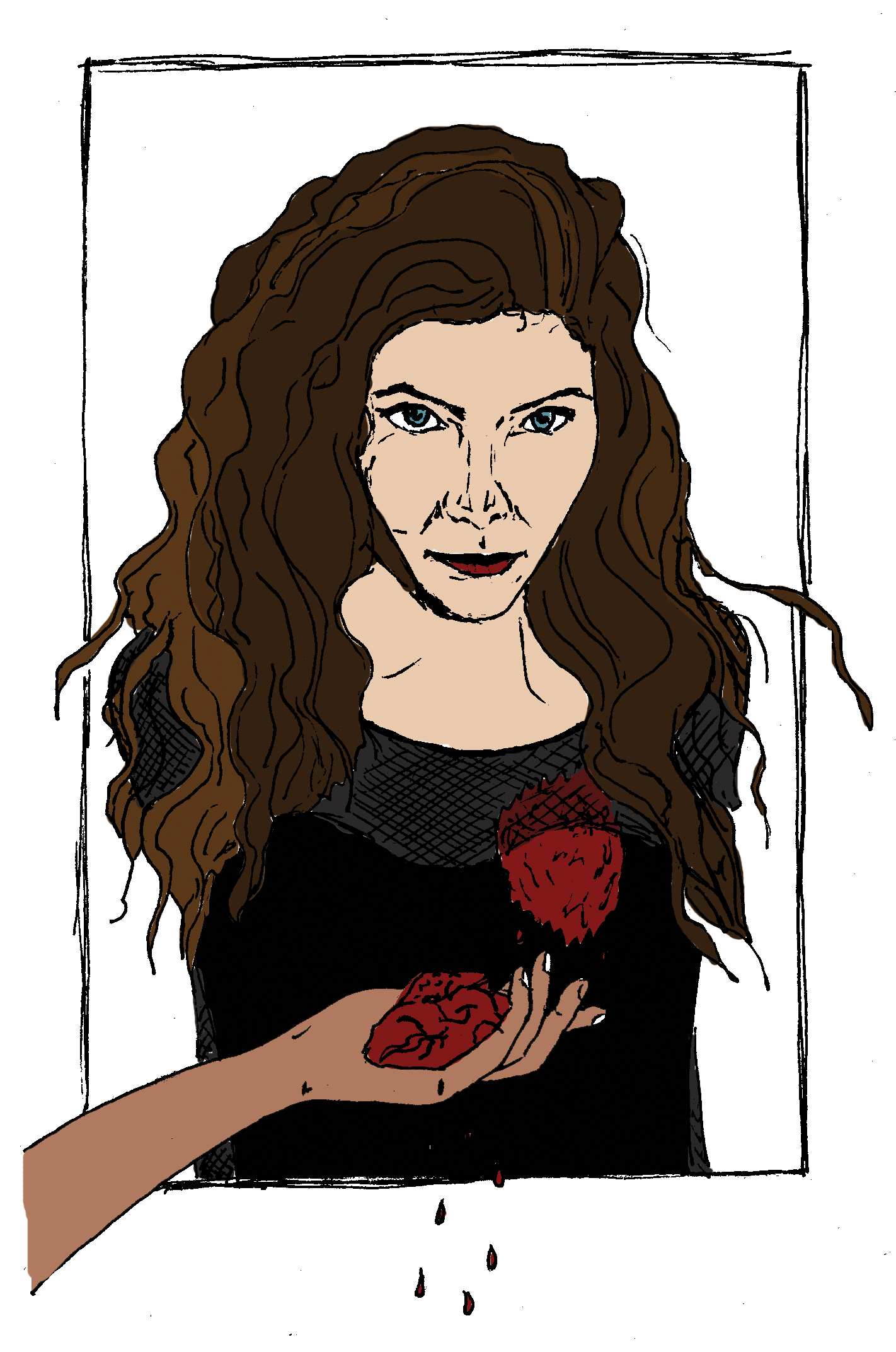In ‘Melodrama,’ Lorde embraces vulnerability
November 10, 2017
 Kayla Snyder
Kayla SnyderFor its last three installments of the semester, The Aux Cord will review three of the best albums of 2017.
A lot can change between ages 16 and 20. They’re some of “the formative years,” after all. Singer/songwriters have reminisced about those days to the point of exhaustion, making us collectively cringe every time we hear “adolescence” or “teen angst.” But rarely do we see an artist release music at both ends of that time period, showing an actual transformation rather than a recollection. Even less often is that artist as talented as Lorde. However that’s exactly where we find her in 2017, 20 years old and four years removed from “Pure Heroine,” her dark, minimalist debut that gave us “Royals,” a pop hit defiant of pop culture and riddled with bleak cynicism.
For “Melodrama,” released in June, Lorde trades in the shadowy trap beats of “Pure Heroine” for piano balladry and stormy electronics. But a more seismic shift is apparent when a hopeful piano riff enters in “Green Light,” the album’s first track. The song takes an unfamiliar turn for Lorde into mainstream pop and more personal songwriting. Where “Pure Heroine” saw Lorde scowling at the world from afar, “Melodrama” is more involved, as Lorde dances in the middle of her own storm, rather than glaring back at it. Of course, self-reflection doesn’t always equate to intimacy or uniqueness. Remember, we’re talking about “teen angst” here. But Lorde finds authenticity by embracing all aspects of herself: the jaded, the unsure and the melancholy.
In fact, “Melodrama” often combines all of these in overwhelming fashion. “The Louvre” begins in whispers about obsession and builds into an enveloping force, much like the obsession she speaks of. Co-produced by Flume, the song wells up from a lone guitar into a whirlwind of synths and reverb-heavy vocals. Nowhere is Lorde’s complex set of emotions better illustrated than the transition from tender, “Blow all my friendships / to sit in hell with you,” to bashful, “Broadcast the boom, boom, boom, boom and make them all dance to it.”
Lines like the latter show that Lorde hasn’t shed all of her “Pure Heroine” flare: the ironic cynicism that made songs like “Royals” and “Tennis Courts” so poignant. Amidst a turn towards electropop, it’s refreshing to see that Lorde can reconcile a mainstream sound with dark humor. Indeed, “Melodrama” would seem incomplete without its moments of scorn, with snickering lines like, “Guess you wanna rip my heart out … well guess what, I like that.” Lorde’s villainous persona cuts at the notion that she might be sacrificing her personality for relatability.
That isn’t to say “Melodrama” isn’t relatable; it is painfully so. Songs about being left out of plans and overthinking punctuation make Lorde a poster child for millennial strife. But Lorde taps into something deeper here. The album revolves around a vain yearning for perfection, uncomfortably reflective of our time. This meditation is most evident in Lorde’s narration of partying, flipping its expectation of ecstasy into a more complicated reality. Lines are haunting (“But what will we do when we’re sober?”), cheekily ambivalent (“Might get your friend to drive but he can hardly see / We’ll end up painted on the road… I guess we’re partying”) or downright damning (“The terror, and the horror / God, I wonder why we bother”).
When the party is over, her disdain is replaced by vulnerability and heartbreaking self-consciousness. “Liability” is stunning; the piano ballad brings an abrupt end to the album’s upbeat start: “Truth is I am a toy that people enjoy / Till all of the tricks don’t work anymore.” Balladry like this is new territory for Lorde. It’s minimalist, but it’s a far cry from the skeletal trap of “Pure Heroine.” The simple, melodic production allows more room for the unique vocal inflections that put Lorde in a world apart: The sudden low dive on the bridge of “Green Light.” The near wail of the chorus on “Writer in the Dark.” Lorde builds her voice up from an anxious tremor to a forceful strut on “Hard Feelings.” They’re risks that no other pop star would dare take, but Lorde executes them with conviction. The variation is a testament to Lorde’s vocal command, as she compiles a heap of emotions as complicated and endearing as the teenage experience itself.
Much like those teenage years, “Melodrama” is a tempestuous, yet rewarding jaunt. Lorde guides us through an age overwhelmed by raw emotion and uncertainty, and masterfully so. The album’s final track, the deceptively celebratory “Perfect Places,” sounds like a coming of age for someone who still hasn’t figured much out. However, at 20, it’s clear that she’s over the oversimplifying: “What the fuck are perfect places anyway?” For a generation defined by endless expectations, it’s an important question to ask.

Comments
Before submitting a comment, please review our comment policy. Some key points from the policy: